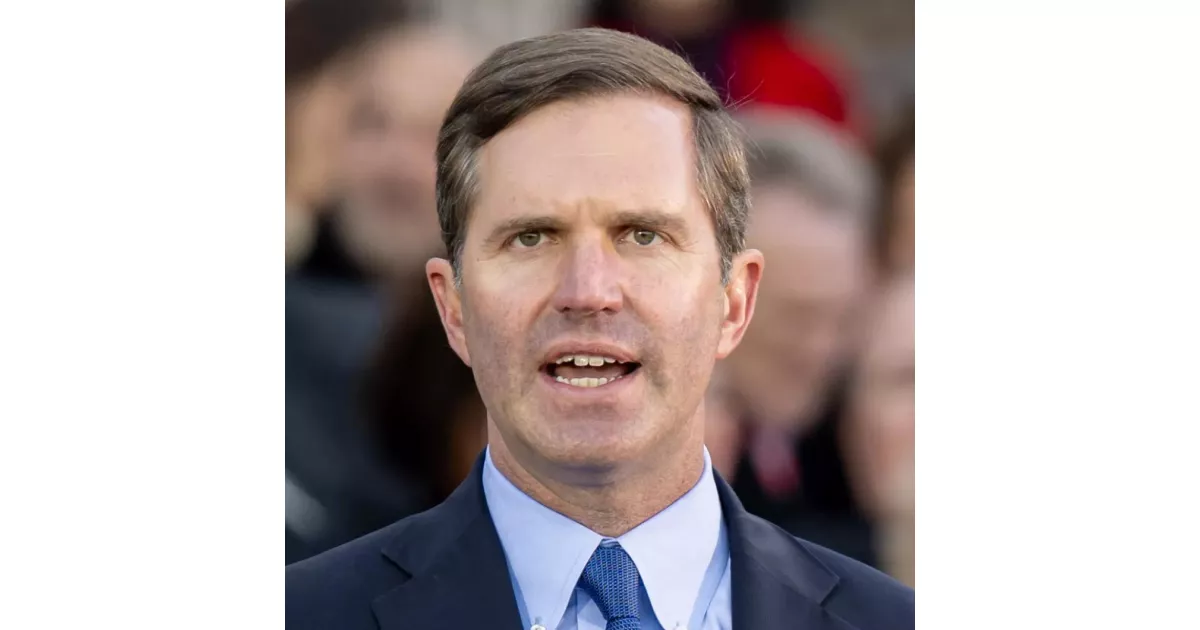Andrew Graham Beshear is the current governor of Kentucky, serving since 2019. A Democrat, he previously served as the state's Attorney General from 2016 to 2019. Beshear is the son of former Kentucky Governor Steve Beshear, who held the office from 2007 to 2015. His political career is notable for continuing a family legacy of leadership within the state.
November 29, 1977: Birth of Andy Beshear
On November 29, 1977, Andrew Graham Beshear was born.
1990: Kentucky Education Reform Act
In 1990, the Kentucky Education Reform Act sought to insulate the Board of Education from political influence.
2000: Start of pension debt accumulation
Governor Beshear has sought to fund the state's pension system, which has accumulated $24 billion in debt since 2000, the most of any state in the country.
2000: Graduation from Vanderbilt University
In 2000, Andy Beshear graduated magna cum laude with a bachelor of arts in political science and anthropology from Vanderbilt University.
2001: Summer Associate at White & Case LLP
In 2001, Andy Beshear worked as a summer associate at White & Case LLP in New York.
2003: Receives Juris Doctor from University of Virginia
In 2003, Andy Beshear received a Juris Doctor from the University of Virginia School of Law.
2005: Hired by Stites & Harbison
In 2005, Andy Beshear was hired by the law firm Stites & Harbison, where his father was a partner.
2007: Father Becomes Governor
In 2007, Steve Beshear, Andy Beshear's father, became the governor of Kentucky.
November 2013: Announces Candidacy for Attorney General
In November 2013, Andy Beshear announced his candidacy in the 2015 election for Attorney General of Kentucky.
2013: Consumer Lawyer of the Year
In 2013, Lawyer Monthly named Andy Beshear its "Consumer Lawyer of the Year – USA".
2013: kynect started during Steve Beshear's term
In 2013, kynect, the state health insurance marketplace that was started during Steve Beshear's term as governor.
2015: Democratic primary for Kentucky attorney general
In 2015, Beshear ran unopposed in the Democratic primary for Kentucky attorney general.
2015: Father's Term as Governor Ends
In 2015, Steve Beshear's term as the governor of Kentucky came to an end.
April 2016: Sues Bevin over Budget Cuts
In April 2016, Andy Beshear sued Governor Matt Bevin over his mid-cycle budget cuts to the state university system and won the case.
2017: kynect dismantled by Bevin
In 2017, kynect, the state health insurance marketplace that was dismantled by Bevin.
2017: Kentucky Supreme Court Dismisses Lawsuit
In 2017, the Kentucky Supreme Court dismissed a lawsuit Andy Beshear brought against Matt Bevin, holding that Bevin had the power to temporarily reshape boards while the legislature is out of session.
April 2018: Successfully Sues Bevin over Pension Reform Bill
In April 2018, Andy Beshear successfully sued Matt Bevin for signing Senate Bill 151, a controversial plan to reform teacher pensions, with the Kentucky Supreme Court ruling the bill unconstitutional.
July 9, 2018: Declares Candidacy for Governor
On July 9, 2018, Andy Beshear declared his candidacy for the Democratic nomination for governor of Kentucky in the 2019 election.
May 2019: Wins Democratic Nomination
In May 2019, Andy Beshear won the Democratic nomination for governor with 37.9% of the vote in a three-way contest.
October 2019: Files Lawsuits Against Pharmaceutical Companies
In October 2019, Andy Beshear filed nine lawsuits against pharmaceutical companies for their alleged involvement in fueling Kentucky's opioid epidemic.
December 10, 2019: Resigns as Attorney General, Inaugurated as Governor
On December 10, 2019, Andy Beshear resigned from his position as Attorney General and was inaugurated as the Governor of Kentucky on the same day.
December 12, 2019: Restores Voting Rights to Felons
On December 12, 2019, Andy Beshear signed an executive order restoring voting rights to over 180,000 Kentuckians convicted of nonviolent felonies.
December 2019: Kentucky to continue accepting refugees
In December 2019, Governor Beshear told President Donald Trump's administration that he planned to have Kentucky continue to accept refugees under the U.S. immigration program.
December 2019: Began term as Governor
The Beshear administration reported that since becoming governor in December 2019, his administration has announced more than 1,200 private-sector new-location, and expansion projects totaling close to $40 billion in announced investments, and creating nearly 63,000 new jobs.
2019: Defeats Bevin in General Election
In 2019, Andy Beshear defeated incumbent Governor Matt Bevin in the general election.
2019: Beshear Defeats Bevin in Gubernatorial Election
In 2019, Andy Beshear ran in the gubernatorial election and defeated Matt Bevin by approximately 0.4%.
2019: Improved performance in suburban precincts
In 2019, Beshear most improved his performance in suburban precincts; he increased his margins by nearly six percentage points in suburban areas, compared to 4.5 percentage points in urban and rural precincts.
2019: 2019
In 2019, Beshear pledged to bring more advanced manufacturing jobs and health care jobs to Kentucky, to offset job losses due to the decline of coal. He is providing funds to help communities throughout the state, establishing industrial parks, and assisting in job growth.
2019: Pledge to bring more jobs to Kentucky
In 2019, Governor Beshear pledged to bring more advanced manufacturing jobs and health care jobs to Kentucky, to offset job losses due to the decline of coal. He is providing funds to help communities throughout the state, establishing industrial parks, and assisting in job growth.
2019: Proposed teacher pay raise
In 2019, Governor Beshear pledged to include a $2,000 pay raise for all Kentucky teachers in his budgets (at what he estimated would be a cost of $84 million). However, the Kentucky legislature has not included such raises in the budgets it passed.
2019: Views on climate change and clean energy
In 2019, Governor Beshear said he wanted to create more clean energy jobs to employ those who lose their jobs in the coal industry and to expand clean coal technology in Kentucky. Beshear also accepts the scientific consensus on climate change.
2019: Replaces Kentucky Board of Education Members
In 2019, Upon taking office, Andy Beshear replaced all 11 members of the Kentucky Board of Education before the end of their two-year terms.
March 2020: Responsible Gambling Awareness Month
In March 2020, Governor Beshear proclaimed March 2020 Responsible Gambling Awareness Month in Kentucky.
March 25, 2020: Declares State of Emergency Over COVID-19 Pandemic
On March 25, 2020, Andy Beshear declared a state of emergency over the COVID-19 pandemic and encouraged business owners to require customers to wear face coverings while indoors.
April 2020: Vetoes Bill on Abortion Restrictions
In April 2020, Andy Beshear vetoed a bill that would have allowed Attorney General Daniel Cameron to suspend abortions during the COVID-19 pandemic and exercise more power regulating clinics that offer abortions.
April 2020: Orders Recording of Churchgoers' License Plates
In April 2020, during the COVID-19 pandemic, Andy Beshear ordered Kentucky state troopers to record the license plate numbers of churchgoers who violated the state's stay-at-home order to attend in-person Easter Sunday church services.
April 2020: Legislature overrides veto on tax break for distilleries and breweries
In April 2020, the Kentucky legislature overrode Governor Beshear's veto after he vetoed a provision to allow distilleries and breweries to qualify for a sales tax break on new equipment.
June 2020: Promises Free Healthcare for African-Americans
In June 2020, Andy Beshear promised to provide free health care to all African-American residents of Kentucky who need it to resolve healthcare inequities during the COVID-19 pandemic.
June 30, 2020: Kentucky State Pension Fund status
As of June 30, 2020, the Kentucky State Pension Fund was at 58.8% of its obligations for the coming decades.
August 2020: Executive order releasing inmates
In August 2020, Governor Beshear signed an executive order to release inmates from overcrowded prisons and jails in an effort to slow the spread of the virus. However, subsequent research indicated that over 48% of those released committed a crime within a year.
October 5, 2020: Relaunch and expansion of kynect
On October 5, 2020, Governor Beshear announced the relaunch and expansion of kynect, the state health insurance marketplace that was started in 2013 during Steve Beshear's term as governor and dismantled by Bevin in 2017.
November 2020: COVID-19 restrictions and legal challenges
In November 2020, the Kentucky Supreme Court upheld the constitutionality of Beshear's emergency executive orders. Also in November 2020, Beshear imposed new restrictions to slow the spread of COVID-19, including closing indoor service for restaurants and bars, restricting in-person learning at schools, limiting occupancy at gyms, and limiting social gatherings.
November 18, 2020: Orders Schools to Halt In-Person Learning
On November 18, 2020, Andy Beshear ordered Kentucky's public and private schools to halt in-person learning due to increasing COVID-19 cases.
January 2021: Schools Resume In-Person Learning
In January 2021, Kentucky's public and private schools were expected to resume in-person learning, following Andy Beshear's order to halt in-person learning on November 18, 2020 due to increasing COVID-19 cases.
March 2021: Law signed regarding transfer of minors to adult court
In March 2021, Governor Beshear signed a law that allows judges to decide whether to transfer minors 14 and older to adult court if they are charged with a crime involving a firearm.
March 2021: Veto of bill on rental property damage
In March 2021, after the Kentucky legislature passed a bill to make it a crime to cause $500 or more damage to a rental property, Governor Beshear vetoed the bill, but the Kentucky House and Senate overrode his veto.
March 2021: Legislature Overrides Vetoes
In March 2021, the Kentucky legislature overrode Andy Beshear's vetoes on 27 bills.
June 11, 2021: Lifting of COVID-19 restrictions
On June 11, 2021, Governor Beshear lifted most of Kentucky's COVID-19 restrictions, one day after the Kentucky Supreme Court heard oral argument on the emergency powers issue.
June 2021: Executive order on college athlete compensation
In June 2021, Governor Beshear signed an executive order to allow college athletes to receive name, image, and likeness compensation. It made Kentucky the first state to do so via executive order.
August 2021: Mask mandate in public schools
In August 2021, amid an upsurge in cases driven by the Delta variant, Governor Beshear mandated that face masks be worn in public schools.
August 19, 2021: Temporary restraining order blocking school mask mandate
On August 19, 2021, U.S. District Judge William Bertelsman issued a temporary restraining order blocking the school mask mandate.
August 23, 2021: Rescinding of executive order requiring masks in schools
On August 23, 2021, Governor Beshear rescinded his executive order requiring masks in Kentucky schools.
October 1, 2021: Beshear Declares Candidacy for Reelection
On October 1, 2021, Andy Beshear declared his candidacy for reelection as governor in the 2023 election.
December 2021: Leads Response to Tornado Outbreak
In December 2021, Andy Beshear led the emergency response to a tornado outbreak in western Kentucky.
2021: Restoration of voting rights
In 2021, Governor Beshear signed an executive order completely restoring the voting rights, and right to hold public office, of 180,315 Kentuckians who had been convicted of nonviolent felonies. As of 2021, he had restored rights to more felons than any other governor in American history.
2021: Opposition to funding Brent Spence Bridge project
In 2021, Kentucky Senator Chris McDaniel opposed Governor Beshear's proposal to use the state's rainy day fund or a general fund surplus to help pay for the Brent Spence Bridge project.
July 2022: Responds to Severe Flooding in Appalachia
In July 2022, Andy Beshear worked with the federal government to coordinate search and rescue missions due to severe flooding across Kentucky's Appalachia region.
November 2022: Executive order on medical marijuana
In November 2022, Governor Beshear signed an executive order to allow medical marijuana possession and to regulate delta-8-THC.
January 4, 2023: Selected as Co-Chair of Appalachian Regional Commission
On January 4, 2023, Andy Beshear was selected by fellow Appalachian governors to serve as states' co-chair of the Appalachian Regional Commission for 2023.
March 2023: Veto of bill on transgender youth regulations
In March 2023, Governor Beshear vetoed a bill creating new regulations and restrictions for transgender youth, including a ban on gender-affirming care; the legislature overrode his veto.
March 31, 2023: Signing of SB 47
On March 31, 2023, Governor Beshear signed SB 47, which established a medical cannabis program in Kentucky.
April 10, 2023: Friend killed in Louisville bank shooting
On April 10, 2023, a personal friend of Governor Beshear's was killed by gunfire in the Louisville bank shooting.
November 7, 2023: Beshear Reelected as Governor
On November 7, 2023, Andy Beshear defeated Republican nominee Daniel Cameron to win reelection as governor of Kentucky.
2023: Beshear Reelected as Governor
In 2023, Andy Beshear was reelected to a second term as governor, defeating Daniel Cameron by a wider margin of 5%.
2023: Wins Democratic Primary
In 2023, Andy Beshear won the Democratic primary election, receiving over 90% of the vote.
2023: Cameron Unsuccessfully Runs for Governor
In 2023, Daniel Cameron, who was appointed Attorney General by Beshear, unsuccessfully ran for governor against Beshear.
2023: 2023
On March 31, 2023, he signed SB 47, which established a medical cannabis program in Kentucky.
2024: Creates Political Action Committee
In 2024, Andy Beshear created a political action committee to raise money for candidates who "push back against this national trend of anger politics and division".
2024: Participated in the World Economic Forum in Davos
In 2024, Governor Beshear participated in the World Economic Forum in Davos.
2024: Executive order banning conversion therapy for minors
In 2024, Governor Beshear signed an executive order to ban conversion therapy for minors after Republicans in the state legislature had repeatedly blocked legislative efforts to do so.
March 19, 2025: Expresses Concerns About Federal Agencies
On March 19, 2025, Andy Beshear expressed concerns about federal agencies' ability to function correctly following the Trump administration's efforts to shrink the federal government.
April 2025: Podcast launch
In April 2025, Governor Beshear launched a podcast covering a wide variety of topics.
June 2025: Announcement of new pediatric care campus
In June 2025, Governor Beshear and Norton Children's announced plans to build a new pediatric care campus on more than 150 acres in Jefferson County. The project is expected to create 1,000 jobs and involve an investment of over $1 billion over time.
July 10, 2025: Performance in "42nd Street"
On July 10, 2025, Governor Beshear played the Doctor in the Lexington Opera House's production of 42nd Street.
July 2025: Comments on potential strike of Iran and Isreal
In July 2025, Governor Beshear commented on potential strike of Iran and ceasefire between Israel and Hamas.
August 2025: Report on investments and job creation
In August 2025, the Beshear administration reported that since becoming governor in December 2019, his administration has announced more than 1,200 private-sector new-location, and expansion projects totaling close to $40 billion in announced investments, and creating nearly 63,000 new jobs.
2025: Beshear and Coleman as only Democratic Officials Elected Statewide
As of 2025, Andy Beshear and Lieutenant Governor Jacqueline Coleman are Kentucky's only Democratic officials elected statewide.
2028: Potential Presidential Run
In 2028, Andy Beshear has expressed interest in running for president of the United States.
Mentioned in this timeline

Donald John Trump is an American politician media personality and...
Virginia officially the Commonwealth of Virginia is a state located...

A tornado is a rotating column of air connecting the...
Kentucky officially the Commonwealth of Kentucky is a state located...
Ohio is a Midwestern U S state bordering Lake Erie...
Indiana nicknamed the Hoosier State is a Midwestern state in...
Trending
2 months ago American Water: Grants Awarded, Lead Line Detection Efforts Underway in West Virginia
2 months ago GameStop's Valuation, Investor Sentiment, Burry's Email, and Strategic Shifts Analyzed.

3 months ago Lindsey Vonn's record-breaking career, teaching older athletes, and Milan Olympics ad.
3 months ago Europe and Germany Increase Support and Negotiation Efforts for Ukraine Amidst War

9 months ago PSG triumphs over Arsenal; Enrique reflects on Barcelona's Champions League absence.
Silver Ag a transition metal with atomic number is a soft lustrous whitish-gray element notable for its exceptional electrical conductivity...
Popular

Thomas Douglas Homan is an American law enforcement officer who...

William Franklin Graham III commonly known as Franklin Graham is...

XXXTentacion born Jahseh Dwayne Ricardo Onfroy was a controversial yet...

Kristi Noem is an American politician who has served as...

Jupiter is the fifth and largest planet from the Sun...

Instagram is a photo and video-sharing social networking service owned...
